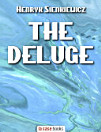WITH FIRE & SWORD Trilogy: Historical Novels: With Fire and Sword, The Deluge & Pan Michael
Henryk Sienkiewicz
Dec 2023 · DigiCat
Ebook
2470
Pages
family_home
Eligible
info
reportRatings and reviews aren’t verified Learn More
About this ebook
Henryk Sienkiewicz's "With Fire & Sword" Trilogy masterfully intertwines historical fiction with epic narrative, vividly depicting the tumultuous period of the 17th-century Polish-Lithuanian Commonwealth during the Khmelnytsky Uprising. Sienkiewicz employs a rich, descriptive prose style, immersing readers in the vibrant yet brutal world of noble warriors, existential struggles, and cultural conflict. His portrayal of historical events is laced with deep philosophical undercurrents, offering a commentary not only on the nature of war and valor but also on love and vengeance, capturing the zeitgeist of a formative era in Central European history. Sienkiewicz himself was deeply influenced by his Polish heritage and concern for national identity, which inspired him to illuminate a period often overshadowed by more prominent European stories. As a laureate of the Nobel Prize in Literature, his experiences of loss and cultural revival provided fertile ground for his storytelling, allowing him to weave personal narratives into historical tapestry with unparalleled depth and insight. This trilogy is essential for readers interested in engaging with Poland's rich historical narrative through a literary lens. Sienkiewicz's emotional and detailed storytelling will resonate with anyone seeking adventure, romantic intrigue, and a profound reflection on the human condition amidst chaos. A must-read for fans of historical fiction!
About the author
Henryk Sienkiewicz (1846–1916) was a Polish novelist, born into an impoverished noble family in Wola Okrzejska. A man of letters who captured the imagination of the Polish people, Sienkiewicz is perhaps best known for his epic historical novels, which have earned him not just national fame but also international acclaim. He won the Nobel Prize in Literature in 1905, primarily in recognition of his monumental trilogy, 'With Fire and Sword,' 'The Deluge,' and 'Fire in the Steppe,' collectively known as 'The Trilogy,' which depicts a vivid and panoramic tapestry of 17th century Polish life and epic battles. These works are characterized by an enthralling narrative, meticulous historical research, and a romantic literary style that portrayed the fabled past with nationalism and a flourish of reconstructive idealism. Sienkiewicz's 'The Trilogy' became a literary sensation not only for its story-telling prowess but also for strengthening Polish cultural identity under partitioned rule. His writings resonate with themes of patriotism, morality, and individual heroism, which appealed to readers struggling for sovereignty in the face of foreign domination. Sienkiewicz's influence endures in the world of literature; he masterfully fused historical authenticity with fictional narrative, making significant contributions to Polish literature and inspiring future generations of writers.
Rate this ebook
Tell us what you think.
Reading information
Smartphones and tablets
Install the Google Play Books app for Android and iPad/iPhone. It syncs automatically with your account and allows you to read online or offline wherever you are.
Laptops and computers
You can listen to audiobooks purchased on Google Play using your computer's web browser.
eReaders and other devices
To read on e-ink devices like Kobo eReaders, you'll need to download a file and transfer it to your device. Follow the detailed Help Center instructions to transfer the files to supported eReaders.








